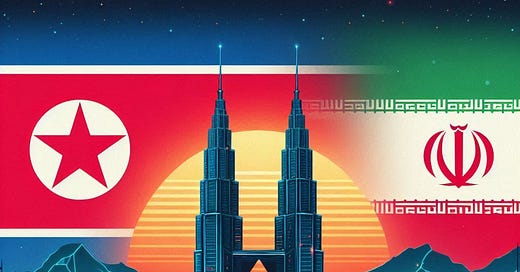NK avoiding Dandong for illicit trade; Putin to DPRK soon; Russian coal via Bandar Abbas; memories of INSTEX
Prohibited Transactions for the week of 10 June 2024 (#51)
This image was created in Microsoft Copilot Designer on 30 May 2024 using the prompt “logo of a cyberpunk city landscape with North Korean and Iranian flags in the background”
North Korea
According to covert reporting from inside North Korea, the DPRK is avoiding Dandong as a trade route to export goods into the PRC. Instead, they are using the Chinese cities of Hunchun and Linjiang, both in Jilin province, which are more remote and less accessible than Dandong. The DPRK is reportedly importing and exporting goods subject to sanctions via the Jilin cities, while only moving construction materials and food via Dandong. //As much as both countries rail against US sanctions, they are still mindful of not too openly flouting them.
A law enforcement delegation from North Korea is visiting Russian counterparts this week, and could be discussing sending North Korean workers abroad to assist Russia in its labor shortage. //As noted in Issue #49, North Korean workers in Russia face stricter controls in general.
Russian President Vladimir Putin may visit the DPRK as soon as this upcoming week, which could result in upgraded military ties between the two countries.
South Korea estimates that the DPRK sent at least 10,000 shipping containers to Russia, which could have contained as many as 4.8 million artillery shells. In exchange, Pyongyang received technology for its satellites as well as other conventional arms.
A review of satellite imagery from April 2024 reveals what appears to be a North Korean tankers docking at Russian ports, likely transporting refined petroleum products back to the DPRK. A Russian cargo ship was also seen at a North Korean port around the same time period, possibly picking up North Korean weapons.
According to covert reporting from inside North Korea, North Korean managers in Russia are slowly being replaced due to an inability to stop North Korean workers from attempting to defect, and because teams are not making their foreign currency quota payments.
--
South Korean prosecutors indicted the head of the country’s main opposition party, on charges of bribery and violations of the Foreign Exchange Transactions Act and Inter-Korean Exchange and Cooperation Act, for conspiring to send USD8 million to the DPRK in 2019 and 2020.
According to covert reporting from inside North Korea, the government may be planning to convert the now shuttered Kaesong Industrial Complex (KIC) into a modern industrial park. //South Korea has previously threatened legal action if Pyongyang engages in unauthorized use of the KIC (see Issues #3 and #50).
Iran
Russia plans to transport coal to India through Iran’s Bandar Abbas port, which is part of the International North-South Transit Corridor (INSTC). Moscow also indicated it is planning for closer transportation cooperation between the two countries, including completion of the Rasht-Astara railway project (see Issue #36). //Iran continues to do what it can to promote its integration into regional transport corridors.
The Sanctions Age podcast released an interview with Stephen Fallon, who was previously the chief compliance officer of INSTEX — the attempt by a number of European nations to maintain legitimate trade between the EU and Iran. Fallon describes the work of INSTEX, as well as broader issues related to financial power. //For those who had followed INSTEX during its years of operation, this podcast should bring back some memories. Very interesting to hear an insider’s perspective on what worked and what didn’t. Also, I highly recommend The Sanctions Age podcast if you’re interested in some of the bigger issues related to sanctions and financial power in this day and age.
--
Private business representatives from Iran and Russia met to discuss ways to improve trade between the two countries. An Iranian representative from the nation’s chamber of commerce noted that customs, transportation and money transfer issues are the obstacles hindering closer trade relations between the two countries.
At the recent BRICS ministerial meeting, Iran’s foreign minister urged the group of nations to accelerate the use of national currencies to conduct transactions, establish joint banking platforms, use digital currencies, and set up new banking structures.
The Central Bank of Iran supplied USD13.6 billion in foreign currency for the import of medical and essential goods, technical and engineering services, agricultural goods and raw materials between March and June 2024.
Iran’s Chamber of Commerce is urging the nation’s commercial attachés to increase efforts to boost Iran’s foreign trade.



